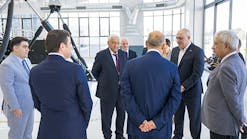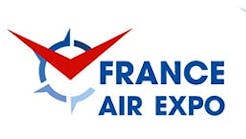Jun. 23—Ruby Sallah and Charlotte Herman huddled with eight other students around an aviation radio in an airplane hangar, trying to glean weather and visibility information from the fuzzy, rapid-fire message sent by a local air traffic controller.
It was stuff the two girls — Ruby, 14, and Charlotte, 13 — will need to know if they ever pilot planes.
Surrounded by shiny, pricey-looking private planes at the Jet Center at Santa Fe, the girls participated Tuesday in the local nonprofit STEM Santa Fe's inaugural aviation and aerospace camp for girls and nonbinary students.
It was the second day of camp and the kind of summer day many teens might prefer to spend goofing off with friends or watching movies.
Not Ruby and Charlotte.
They listened as Jess Caskey, a Taos-based pilot and flight instructor at Fly Taos Sky, walked them through each cryptic string of letters and numbers the air traffic controller relayed over the radio — deftly picking out important notes like the dew point, temperature, location and, finally, a "notice to the airman" used to alert pilots of potential hazards.
Caskey paused.
"I hate that term, so we call them 'notices to pilots,' " she said. "There's a bunch of girls here; we don't need 'airmen.' "
Caskey, a human resources professional by day who embarked on her lifelong dream of becoming a pilot five years ago, hopes some of the students in the program will follow her lead.
Her goal is to make flying a full-time gig. She wants to work as a charter pilot or enter the international commercial industry, flying planes for companies like FedEx.
Women have made major leaps in the labor market since the 1950s, when they made up less than 30 percent of the overall workforce. In 2018, according to the Pew Research Center, women filled just under 47 percent of U.S. jobs.
But people in the aviation world say women's participation in related careers — from piloting to air traffic control to mechanics — has remained despairingly low.
Of 185,143 total airline pilots working worldwide in 2020, just 9,746 — or under 6 percent — were women, according to data from the International Society of Women Airline Pilots. Just a couple of thousand women held the title of captain.
"Even if one pilot came out of this, that would be amazing," Caskey said of this week's camp after wrapping up her lesson on aviation radio communication.
In her eyes, women are rarely encouraged to fly. Instead, they're encouraged to do "girly things."
"This should be a 'girly thing,' " Caskey said. "It's just a matter of finding the right person who's going to lift you up and encourage you to do it."
The middle and high school students kicked off the camp Monday by touring the inside of a $30 million "Super Scooper" — one of only eight such planes in the U.S., all of which have been deployed to New Mexico to help fight the record-breaking wildfires.
They'll cap off the camp Friday when a group of female pilots will take them on flights in private planes from the Santa Fe Regional Airport to Cochiti Pueblo and back.
Lina Germann, founder and CEO of STEM Santa Fe, said she's always looking for disciplines in STEM fields — science, technology, engineering and math — that could be interesting to students and have high employment rates.
When she learned about the gender gap in aviation, Germann got to work. She connected with the Rio Grande Norte Chapter of the Ninety-Nines Inc., an international organization of licensed women pilots, and the Land of Enchantment Chapter of Women in Aviation International.
"It's all these ladies, and they all said, 'Let's do it,' " Germann said.
She applied for a grant from the International Society of Transport Aircraft Trading, and the group awarded STEM Santa Fe $7,000. Jet Center at Santa Fe manager and general partner Troy Padilla then opened his hangar for the program. The center, which provides services for private and commercial planes, is based at Santa Fe Regional Airport.
Germann said being able to host a camp at the airport, around real planes and equipment, helped make aviation careers seem more tangible to the participants.
She also made sure the weeklong program was accessible to local students. The registration fee of $25 was waived for students in need.
Some of the program's participants said they would like see more programs available for girls in fields like aviation.
"When my mom was a kid, there was just Girl Scouts," said Ruby, whose mother works in computer science. "That never interested me. It was always cars, coding — all that stuff."
Ruby said she wants to fly planes — and maybe even own a private jet one day. Her fascination with aviation stems from long hours she spent in the garage with her dad, dismantling and reassembling the family's Ford Focus for fun.
Rio Garcia, who will be a freshman at Mandela International Magnet School in the fall, is planning to join the U.S. Air Force, like her grandfather did.
When she told her friends she was going to an aviation camp, she said, some of them warned her against it, believing the other participants might all be boys.
For Rio, that's an example of how girls and nonbinary kids get dissuaded from fields like aviation.
Charlotte's dad once flew planes in the Army — part of her reason for considering a career in aviation.
"I've always had a really big fascination with planes," said Charlotte, who will attend St. Michael's High School in the fall. "A career in flight would be awesome."
Padilla spoke to the group Tuesday about how he moved up from a job in high school fueling planes at the Santa Fe Regional Airport to earning a pilot's license and then managing jet centers for private and commercial aircraft, including in Santa Fe.
"Believe me, I didn't come from money or means," Padilla said. "Don't sell yourself short, please."
The drive to get more girls interested in airplanes is twofold, he said: The number of women in the industry is dismal, and overall there is a huge demand for workers in all facets of aviation.
CNBC reported in May the coronavirus pandemic had slowed pilot training and licensing, just as major U.S. airlines gave early retirement packages to thousands of pilots and employees to cut down on labor costs, particularly during pandemic-related shutdowns that slowed travel.
Now U.S. airlines, which received billions of dollars in federal pandemic relief funds, need to fill more than 12,000 pilot seats — especially those based in smaller cities. Some are advocating to raise the mandatory retirement age for U.S. pilots above 65 to help ease the vacancies.
In response to claims of a pilot shortage, the Air Line Pilots Association International recently called for several initiatives, including incentivizing pilot training for U.S. students and recruiting a more "diverse" workforce, with more women.
Padilla and Caskey made clear to camp participants that getting to fly is often about making the right connections.
Ruby wasn't fazed by the low numbers of women in the industry.
"I feel like we're the generation that's going to put so many women in STEM," she said.
___
(c)2022 The Santa Fe New Mexican (Santa Fe, N.M.)
Visit The Santa Fe New Mexican (Santa Fe, N.M.) at www.santafenewmexican.com
Distributed by Tribune Content Agency, LLC.



